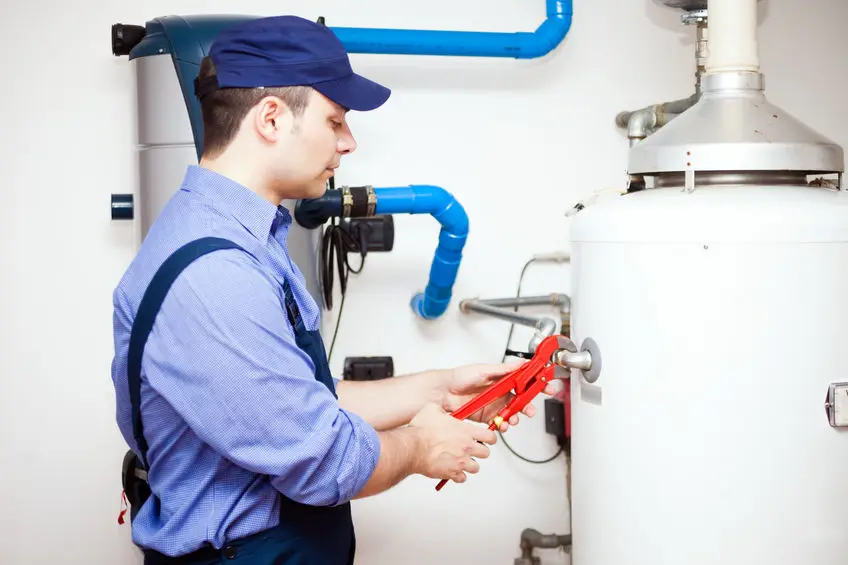
All water heaters are not made equal – and the variations in efficiency, reliability, fuel type and heating method are often reflected in the price of a water heater and its installation.
Some of these options focus primarily on performance and meeting the hot water needs of high-demand households while others are intended to minimize your home's carbon footprint. Each has their own benefits and drawbacks.
CONVENTIONAL STORAGE WATER HEATERS
When most people think of home water heaters, they think of the tall cylinder tanks standing in garages, laundry rooms or basements. These are still the most common type of home water heater and are generally the most affordable to purchase and install.
TANKLESS/ON-DEMAND WATER HEATERS
A tankless water heater is mounted on a wall and looks almost like a big breaker box with pipes going into and out of it. These heaters don't store water in a tank but instead heat water as it's moved through the heater, providing hot water "on-demand."
SOLAR WATER HEATERS
A solar water heater looks kind of like a big solar panel with a conventional storage water tank attached to the top. Looks aren't deceiving in this case – that's essentially what it is. Instead of traditional solar panels it has tubes that absorb the sun's heat and transfers it to the water in the tank.
ALTERNATIVE WATER HEATER OPTIONS
There are a variety of other water heater options, such as condensing water heaters that recycle exhaust for more efficient heating and heat pump water heaters that work like an HVAC heat pump except to heat water instead of a home's indoor air.
These water heaters are less common than some of the more traditional widely used options, but they may be right for certain homeowners.
WHICH WATER HEATING METHOD IS MOST AFFORDABLE
Solar water heating is essentially free, but it's also reliant on clear skies and may not be able to refill as quickly as the other options.
Natural gas water heaters are usually considered more affordable than electric because natural gas has consistently been the cheaper, more efficient heating option in recent times.
There are a lot of variables to take into account when trying to estimate energy costs for water heaters, but there are some basic calculations you can do on your own to get a ballpark utility cost estimate. For example, if a household's 4,000-watt electric water heater runs for three hours a day and the cost of each kWh is $0.10, it would cost (3 x 4 x $0.10) $1.20 each day.
If the same household had a comparable gas unit (three-hour runtime per day) that consumed 0.205 therms per hour at a cost of $1 per therm (3 x .205 x 1), it would cost $0.62 a day.
This is just an example of how you might calculate estimated energy costs. Actual costs vary by locality, provider and demand. Each household is also different, and some heaters may run for longer than others based on water usage. Efficiency is the other big factor.
You can find a convenient calculator here for electrical water heater estimates.
THE BENEFITS OF TANKLESS WATER HEATERS
The example calculation above doesn't apply to tankless water heaters since they don't have a reservoir that needs to be kept heated 24/7. Tankless water heaters offer on-demand hot water, meaning they only run when someone turns on hot water in the home.
It's worth noting that when traditional water heaters leak it's often an issue with the reservoir tank itself, which isn't a risk for tankless water heaters. Tankless water heater leaks can still happen, but they are much more uncommon.
Tankless water heaters cost more to install than most traditional water heaters, but they are more efficient and will save homeowners money on their utilities. They also tend to last longer, with an average estimated life of 20 years compared to 10 to 15 years for a traditional tank water heater.
WE'LL WORK WITH YOUR SCHEDULE
Many homeowners take their water heater for granted until something goes wrong. In many cases, people make decisions about a new water heater after their current one breaks down. If that's your situation, you may be in a hurry to replace it with something comparable just to restore your home's hot water.
Switching to a tankless water heater isn't always easy. Plumbing, gas and electrical retrofitting may be necessary, and exhaust venting systems may need to be designed and installed to make tankless a workable option for your family.
At Vito Services, we value our clients' time and comfort, which is why we strive to perform our detail-oriented work quickly and with uncompromising quality. We want to provide all the information you need to make the decision that's right for your family. Once you've made your choice, we'll do our best to minimize any downtime or inconvenience for your household.
WHY SHOULD YOU CALL VITO SERVICES FOR WATER HEATER REPLACEMENT OR SERVICE IN THE D.C. METRO AREA?
When you calculate the per-day cost of heating water it may not seem like much, but it adds up over a year. In the previously calculated examples, the electric water heater would cost about $438 per year and the gas would cost about $224 per year.
The U.S. Energy Department estimates that about 18 percent of the average home's energy usage goes toward heating water, making it the second most expensive home comfort utility (following HVAC heating and cooling).
Vito Services would be happy to discuss your water heater replacement options and provide advice on which water heaters can save you money while meeting your household's needs. Call us at 301-315-6100 to schedule a consultation or service.








